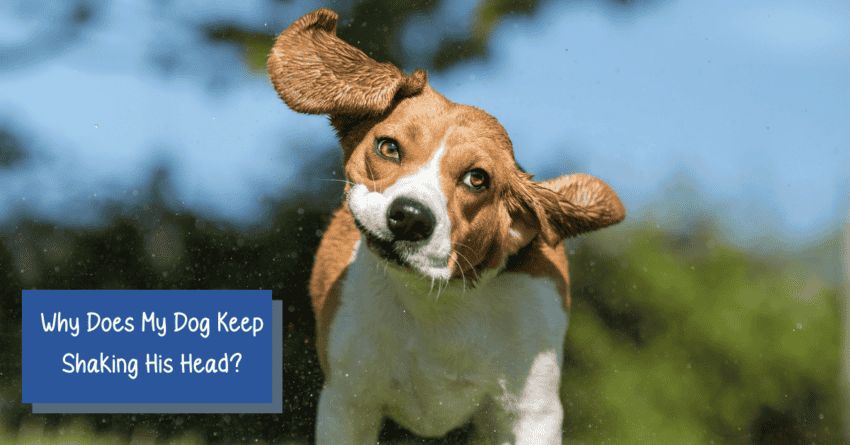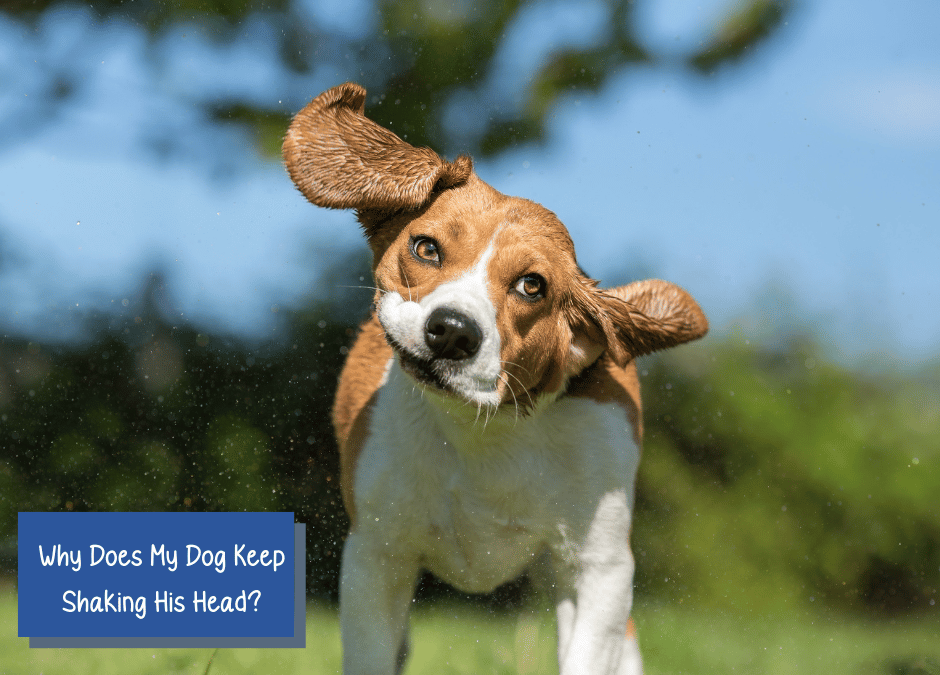“Why does my dog keep shaking his head? Is something wrong??”
Seeing your dogs shake their heads repeatedly for no apparent reason can be a bit unnerving. After all, it’s a clear indication of their discomfort. The big question is, what kind of discomfort are they dealing with? Is it something minor, like a bug that they’re trying to shake out? Or is it a sign of something more serious, such as a seizure? This question is precisely what I’ll answer with this guide.
So please, read on and find out what’s causing your dog’s head to shake. I’ll also provide some tips about addressing it and determining when a vet visit is necessary. Let’s dive in!

Why Does Your Dog Shake Their Head?
In most cases, a dog shaking their head isn’t a cause for concern. It’s essential to acknowledge it is a natural behavior for them. Otherwise, you’ll go crazy worrying about every single little head shake and shimmy, which isn’t a fun way to live.
In most cases, a head shake here and there represents an easy way to remove something from your dog’s ear. Honestly, the power generated by your dog’s ear shaking is quite impressive. Their shaking will loosen the foreign object and cause it to fall out without issue.
It’s also a defense mechanism against a stray itch or irritation in their ears. So anytime something bothers their ears, they shake their head without a second thought. One shake will usually solve the problem.
But things get much more problematic when this head shaking becomes excessive. It’s time for the owner to figure out what’s causing the issue. In the next section, I’ll discuss several causes that could be behind what makes a dog shake their head repeatedly.
Check out the video below for a quick overview, then keep reading for all of the details!
7 Causes of Excessive Head Shaking in Dogs
Extreme cases of head shaking often fall into one of seven causes. I’ll take you through all of them to provide a better idea of what could be your dog’s ailment. So let’s not waste any more time and start with the most common of these potential causes:
1. Ear Infections
Generally, an ear infection will be behind excessive head shaking in dogs. It’s their attempt to deal with the constant itchiness, inflammation, and discharge caused by them. So your dog’s ear infection is just as uncomfortable as what humans go through when having one.
Checking for an ear infection is relatively easy. These conditions will be noticeable when lifting your dog’s ear flap. In most cases, an infected ear will display discharge, redness, or swelling under the ear flap (these symptoms won’t be present if the infection is too deep).
But don’t try to treat or wait out ear infections without seeking professional help from a vet. These conditions aren’t something to take lightly. If untreated or treated incorrectly, they can cause severe issues.
Check out the video below for tips on how to identify ear infections in dogs:
2. Allergies
As with humans, allergies can be the bane of your dog’s existence. Dogs affected by them will do whatever it takes to relieve the discomfort from the symptoms (itchy skin, hair loss, swelling, etc.) It often results in scratching, head shaking, and other ineffective techniques.
Discomfort caused by allergies isn’t the only annoying thing about them, either. Finding the source of them can also be a time-consuming and frustrating task. It can be anything from an ingredient in their food to something in the environment like pollen.
Determining a food allergy is something an owner can do by themselves. It’s a matter of putting your dog on a stripped-down diet of one never-used protein source and a carbohydrate. You then monitor how your dog reacts to this new diet for one or two months. If the symptoms disappear, you’ve diagnosed a food allergy.
Allergies caused by environmental factors are harder to diagnose. You’ll need a vet to do skin or blood testing to see what’s causing the issue. So it’s not something an owner can do on their own and will cost a lot of money.
3. Earwax Build-Up
Earwax doesn’t seem like a likely culprit for causing such discomfort for a dog. But if you let earwax build up, it’ll cause enough irritation to result in excessive head shaking and scratching around the ear.
So owners would be wise to monitor and address any earwax build-ups. Regular ear cleaning should prevent these issues from ever presenting themselves. It only requires picking up a dog ear cleaner with a stellar reputation. If you’re uncomfortable choosing one, your vet can provide recommendations.
I’ve found cleaning a dog’s ears once a month to be effective. After doing so, I haven’t had a single earwax build-up issue with either of my dogs. It’s another way to ensure my dogs never feel uncomfortable enough where excessive head shaking is necessary.
Watch the video below for some tips on cleaning your dog’s ears:
4. Fleas and Ear Mites
Fleas have been a long-time enemy for pet owners, especially dog lovers. It turns out our best friends aren’t too fond of them either. In response, they’ll often scratch or shake their heads to relieve the discomfort provided by these pests.
Dealing with flea issues quickly is essential, or a skin infection could develop. You’ll notice crusted/inflamed or even bloody skin in these cases. It’s not something any dog owner wants their furry friend to experience.
Thankfully, it’s not hard to determine whether your dog suffers from flea issues. You’ll likely notice them scurrying around in your dog’s fur and see your dog’s constant scratching. OTC topical flea treatment does help, but a vet visit is always recommended.
But fleas aren’t the only tiny pests that can cause head shaking. Ear mites can have your dog shaking their head like they’re at a heavy metal concert. Any dog suffering from ear mites will have noticeable brown debris in their ears and scratch their ears constantly.
As for treatments, I wouldn’t recommend the OTC options. I’ve never seen one of these treatments truly effective on ear mites. I had a devil of a time finding a useful one with a recent foster dog who suffered from mites.
So I scheduled a vet visit and got the prescription medication. It helped deal with the problem immediately and ensured the infestation was gone in three weeks (the ear mite life cycle is about 21 days so any effective treatment will take at least that long).

5. Ear Obstructions
Ear obstructions are a more common occurrence than most dog owners assume. They just don’t usually realize these incidents happen. One vigorous head shake often takes care of these obstructions.
But sometimes, these ear obstructions are more challenging to shake. These obstructions can then stay stuck in your dog’s ear, causing severe irritation and inflammation. In response, your dog starts shaking their head wildly, praying it dislodges.
This obstruction can be anything from grass to rocks. When I wasn’t paying attention, my dog even got a piece of a toy lodged in her ear canal. I was at a loss for words when it finally came out and it was a piece of plastic that came off her favorite squeaking milk carton.
Now owners may think it’s time to take matters into their own hands when this happens. But honestly, your dog’s ear canals are delicate, so let your vet dislodge any obstructions. It’s not a situation where you want to mess up and cause the item to go deeper into the ear.
6. Water in the Ears
There isn’t a more classic cause of head shaking than water getting into your dog’s ears. I can imagine it being highly irritating to them, considering I’m not too fond of it. Getting water in my ears is my least favorite thing about going to the pool.
But a shake or two should solve the issue for your dog when it does happen. However, specific preventive measures can stop it from ever occurring. Placing cotton balls in your dog’s ears before swimming or baths is the most effective.
Of course, my Beagle won’t stand for cotton balls in his ears. He sprints away every time I come near him with a cotton ball. So I had to settle for simply drying and cleaning his ears with ear cleaner after each swim or bath.
Another tip is to avoid pouring water directly on their heads during baths. It only compounds the issue at hand. Instead, I’ve found using a washcloth to clean those areas is a more effective and less problematic approach.
7. Idiopathic Head Tremors
Idiopathic head tremors are a more mysterious cause of excessive head shaking. This condition earns the title because it doesn’t have a known reason for why it happens. But it’ll cause your dog to move their head from side to side or up and down.
In most cases, these tremors aren’t worth worrying about for owners. Idiopathic head tremors will stop on their own without any consequences. Some owners have even found distraction techniques can stop one in its tracks.
But any tremors happening consistently should be examined by a vet. Continuous tremors could indicate a more severe issue requiring immediate medical attention. It’s always better to be safe than sorry with these conditions.
When Does A Vet Visit Becomes Necessary
Any continuous head shaking from a dog warrants a trip to the vet. You’ll only prolong the dog’s discomfort, which no owner wants. So it’s better to get a handle on this condition as soon as possible, primarily if you can’t determine the cause.
Therefore, scheduling a vet visit is the only way to proceed with this issue. You’ll want the best at your disposal to plan a course of action to help your dog. From there, it should become apparent what’s the problem and its solution.
Conclusion
In the end, a dog shaking their head every once in a while isn’t an issue. The problems come when this action becomes continuous or excessive. In these cases, your dog’s head shaking is usually caused by an issue that requires medical assistance, like ear infections or obstructions.
If you have more concerns or questions, leave a comment in our comment section. I’ll answer each as soon as possible to ensure you’re pointed in the right direction. Thanks for reading!


